
Home » Tips for Teachers » Exploring the Evidence: 7 Comprehensive Reasons Why School Should Start Later for Enhanced Student Well-being and Academic Success

Exploring the Evidence: 7 Comprehensive Reasons Why School Should Start Later for Enhanced Student Well-being and Academic Success
The debate on the optimal timing for school start times has gained considerable momentum, presenting compelling reasons why school should start later. This growing consensus among educators, parents, and researchers highlights the profound benefits such a shift could have on student health and academic performance.

Traditionally, schools have adhered to an early morning schedule, a routine that is increasingly viewed as misaligned with adolescent physiological rhythms and conducive to chronic sleep deprivation. This discrepancy between school schedules and the natural sleep patterns of teenagers has sparked a significant reevaluation of how educational institutions can best support the developmental and learning needs of their students.
Advocating for later start times is not merely a call for more sleep; it represents a holistic approach to enhancing the educational environment by optimizing the physical and mental well-being of students. The argument for delayed start times is supported by a wealth of research indicating improvements in various areas of student life, including academic achievement, mental health, and physical wellness.
Reasons why School should Start Later in the Morning: – Better for students sleep and attendance – Don’t need to stay up as late to do homework because you can do it in the morning — Pisha 🍉 ⪩⚢⪨ Et Le Ena Piou (@mafuanenautism) September 30, 2022
However, transitioning to a later schedule also presents logistical challenges and potential drawbacks, such as impacts on extracurricular activities, family routines, and community infrastructure, which must be thoughtfully addressed.
This article embarks on a comprehensive examination of the subject, exploring the multifaceted benefits of starting school later, the considerations and challenges that come with such a change, and the real-world implications as evidenced by initiatives like those undertaken by the Seattle School District. Through this analysis, we aim to provide a balanced perspective on why the shift towards later school start times could represent a significant step forward in fostering environments that truly cater to the needs and potentials of our young learners.
On this page, you will discover:
- The Benefits of Starting School Later →
- The Potential Drawbacks of Starting School Later →
- The Impact of Delayed School Start Times in Seattle School District →
7 Reasons Why School Should Start Later
Wendy Troxel attributes the lack of sufficient sleep among teens not to Snapchat, social lives, or hormones, but to public policy, specifically early school start times, and shares insights from her dual perspective as a sleep researcher and a mother in a must-watch video on how this affects adolescents during a crucial stage of their lives.
Now, let’s delve into the compelling reasons why school should start later, exploring seven key factors that highlight the benefits of adjusting school schedules for the betterment of student health, engagement, and academic performance.
1. Improves Academic Performance
Adequate sleep is essential for adolescents, who are at a pivotal stage of development and learning. The evidence linking sufficient rest to improved academic outcomes is compelling, suggesting that later school start times could play a key role in enhancing students’ educational achievements.
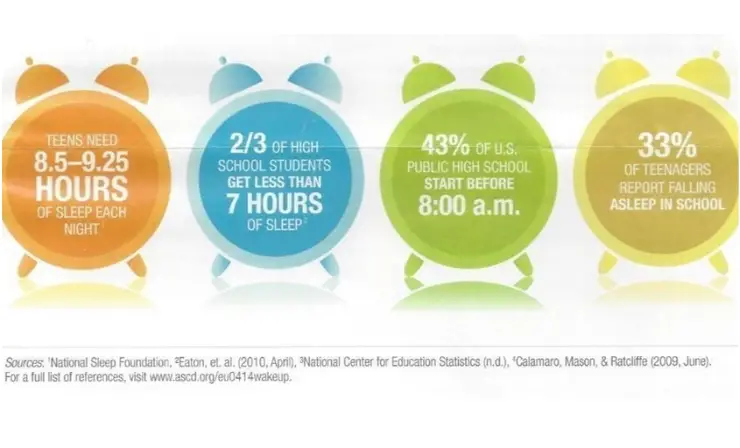
The correlation between adequate sleep and enhanced academic performance is well-documented. Studies by organizations such as the National Sleep Foundation underscore the critical role sleep plays in cognitive functions, including memory retention, focus, and decision-making processes. Adolescents, who are in a crucial phase of brain development, particularly benefit from extended sleep, as it directly influences their ability to learn and excel academically.
A later school start time aligns with their natural sleep cycles, allowing for a more alert and engaged mindset during school hours. This alignment not only fosters an environment conducive to learning but also translates into tangible outcomes such as higher test scores and grade improvements. Consequently, the shift to later start times could serve as a strategic approach to bolster academic success, addressing educational priorities and student well-being in tandem.
Why It Is Important
- Academic success is key for future opportunities, shaping higher education and career paths.
- Enhanced performance from later start times correlates with better cognitive functions: memory, attention, and problem-solving.
- Quality sleep, aligned with circadian rhythms, leads to deeper, more restorative rest, essential for learning and memory.
- Alert, focused students are more likely to actively participate and retain information.
- Benefits individual students and contributes to a positive, productive learning environment.
- Later start times are a strategic approach to enhance educational outcomes and prepare students for success.
Discover in this video how mastering healthy sleep habits can serve as a genuine performance enhancer in the classroom, leading to better sleep and higher GPAs for students.
2. Allows Teens to Get More Sleep
The mismatch between teenagers’ biological clocks and early school schedules is a significant barrier to their health and well-being. Recognizing the critical importance of sleep for this age group underlines the need for adjustments in school start times to support their developmental needs.
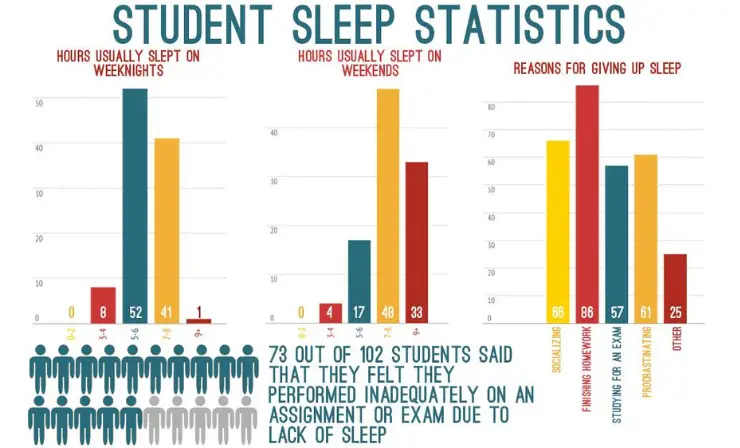
Adopting later school start times harmonizes with teenagers’ biological clocks, addressing the mismatch between early school schedules and adolescents’ sleep needs. The American Academy of Sleep Medicine’s recommendations highlight the importance of adequate sleep for teenagers, a demographic often burdened by early start times and societal pressures that encroach on their sleep duration. This shift not only ensures they meet the optimal sleep quota but also enhances their overall health and cognitive function.
The benefits extend beyond the mere number of hours slept; the quality of sleep improves, fostering better mental, emotional, and physical health. This holistic improvement in well-being is crucial during adolescence, a period marked by significant growth and development challenges.
- Adequate sleep is crucial for teenagers’ physical and mental development, supporting growth, immune response, and emotional regulation.
- Recommended sleep leads to fewer behavioral issues and improved decision-making.
- Important during adolescence, a time of significant development.
- Sufficient sleep is linked to better mood regulation and reduced risk-taking.
- Schools can help teens get the necessary sleep, promoting academic success and well-being.
- Recognizes the link between physical health, mental health, and academic achievement.
Behavioral and social scientist Wendy Troxel explains how early school start times essentially cause daily jetlag for students and advocates for a change in their morning routines in a compelling video worth watching.
3. Reduces Absenteeism
Healthier students are more likely to attend school consistently, underscoring the impact of sleep on immune function and overall wellness. By adapting school schedules to allow for more sleep, educators can directly contribute to reducing absenteeism and enhancing the learning environment.
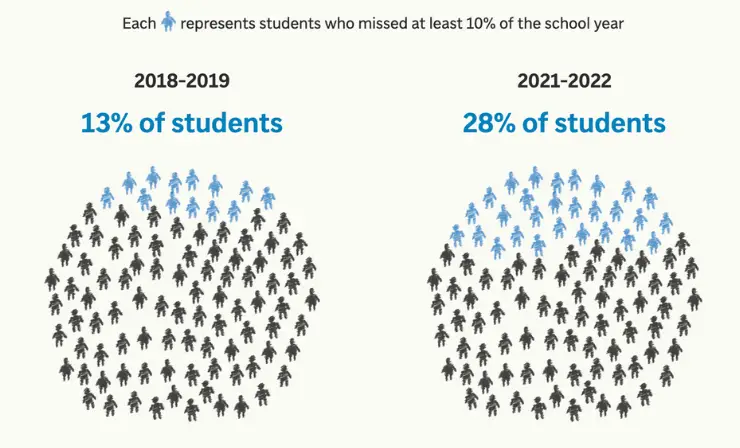
Later school start times contribute to a healthier student body, which directly impacts attendance rates. Sleep deprivation compromises the immune system, making students more susceptible to illness and, consequently, more likely to miss school. By ensuring that students get sufficient rest, schools can see a reduction in absenteeism.
This not only benefits students’ academic performance and continuity of learning but also contributes to a more vibrant, participatory school environment. Improved health outcomes due to adequate sleep thus serve as a preventive measure against common ailments, ensuring that students remain present and engaged in their educational journey.
- Regular attendance is essential for continuous learning and success.
- Each missed day is a lost opportunity for learning and interaction.
- Absenteeism creates knowledge gaps, affecting confidence and curriculum engagement.
- Reducing absenteeism with later start times ensures full participation in education.
- Improves academic outcomes, social integration, and school connectedness.
- Alleviates administrative and teaching challenges, leading to a more efficient educational process.
Matt Pearl explores how what seems like a harmless day off can quickly escalate into habitual truancy, and highlights one school district’s innovative plan to combat this issue and refill empty seats in a must-see video.
4. Lowers Risk of Depression and Mental Health Issues
The crucial relationship between sleep and mental health, particularly in adolescents, cannot be overstated. Addressing sleep deprivation through later school start times is a preventative measure that could significantly improve students’ mental health outcomes.
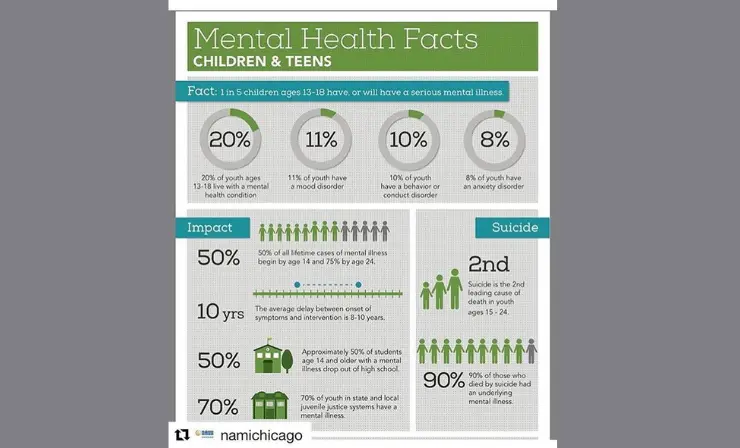
The interplay between sleep and mental health is critical, especially during the volatile adolescent years. Inadequate sleep has been consistently linked to increased risks of depression, anxiety, and other mental health issues. By shifting school start times later, students are afforded the opportunity to align their sleep schedules with their biological needs, significantly mitigating these risks.
This preventive approach to mental health is of paramount importance, considering the rising incidence of mental health challenges among teenagers. Providing an environment that supports adequate sleep can be a fundamental strategy in promoting mental well-being, offering a buffer against the stressors and challenges of adolescence.
- Mental health’s critical role in students’ well-being and success is undeniable, with adolescence being a particularly vulnerable period for the onset of issues like depression and anxiety. Sleep deprivation significantly exacerbates these conditions.
- Ensuring adequate sleep is foundational for robust mental health, enabling students to better manage stress and the myriad challenges of adolescence with greater resilience.
- Schools that implement later start times contribute to a proactive approach to mental health care, leading to a noticeable reduction in the incidence and severity of mental health issues among students.
- This initiative fosters a supportive educational environment where every aspect of student well-being is nurtured, promoting a healthy school climate conducive to learning and growth.
William Brangham delves into why many teens struggle to get the recommended eight to ten hours of sleep, the prevalence of insomnia among them, and the significant impact on their mental health in this insightful video.
Delve into the critical role of mental health in educational success with “ 8 Reasons Why Students Should Have Mental Health Days: A Research-Based Analysis ” offering evidence-based arguments for the integration of mental health days into school policies to enhance student well-being and academic performance.
5. Reduces Drowsy Driving in Teens
With the initiation of driving coinciding with the teenage years, the risk of drowsy driving becomes a pressing concern. Adjusting school start times to ensure teenagers get enough sleep could be a critical step in enhancing road safety and reducing accidents.
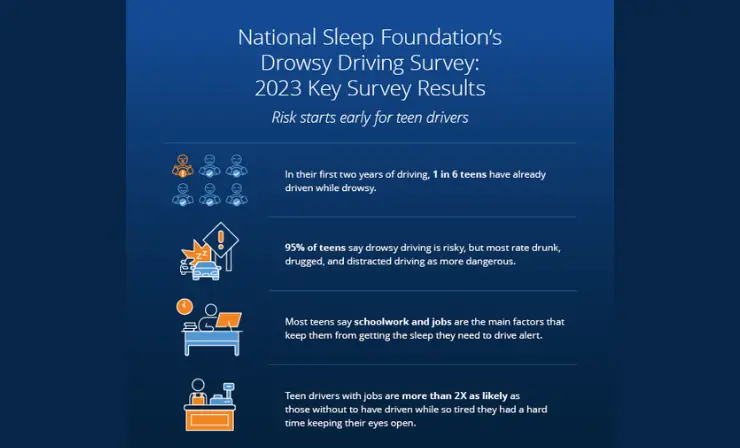
Teenage years coincide with the commencement of driving for many, introducing risks associated with drowsy driving. The CDC has identified sleep deprivation as a key factor in teen driving accidents. By enabling teens to align their sleep schedules with natural rhythms through later school start times, the incidence of drowsy driving can be significantly reduced.
This has the dual benefit of enhancing individual safety and contributing to broader public safety outcomes. Preventing accidents through such measures not only saves lives but also fosters a culture of responsible driving habits among young individuals.
- The safety of teenage drivers is a paramount concern, with drowsy driving posing a significant risk not just to the drivers but to the community at large. The alertness of drivers is crucial and is directly influenced by the amount of sleep they have received.
- By pushing school start times later, we can mitigate the risk of accidents caused by sleep deprivation, significantly enhancing public safety and specifically safeguarding teenage drivers, who are often less experienced and more vulnerable on the road.
- This measure not only prioritizes the health and safety of students but also contributes to the broader goal of ensuring safer roads and communities.
Explore the findings of a new study on teen drivers and the risks of drowsy driving in this informative video recommended for viewing.
6. Helps Teens Feel Happier
Sleep deprivation negatively impacts adolescents’ mood and overall happiness. Schools that adopt later start times can help align students’ schedules with their natural sleep patterns, fostering improved well-being and a more positive school experience.

Aligning school schedules with teenagers’ natural sleep cycles can significantly enhance their overall happiness and well-being. The dissonance between early school start times and adolescents’ biological predisposition for later sleep and wake patterns can lead to chronic sleep deprivation , affecting mood and well-being.
By adopting later start times, schools can help rectify this misalignment, allowing students to adhere to a more natural sleep schedule. This adjustment can lead to improved mood, greater resilience, and a more positive outlook on life, which are crucial for healthy adolescent development and academic success.
- The well-being and happiness of students are essential for their active engagement and enjoyment of their educational journey. Students who are well-rested show a marked increase in engagement, curiosity, and motivation.
- By aligning school start times with teens’ natural sleep cycles, there’s a significant improvement in students’ overall mood and outlook on life, which in turn enhances their social relationships and reduces conflict.
- This positive adjustment has been linked to not only a more vibrant school environment but also to tangible improvements in academic performance, demonstrating the deep interconnectedness between emotional well-being and educational outcomes.
Discover how a high school in Dedham, Massachusetts is combating student feelings of hopelessness with an innovative course on finding happiness through savoring experiences and fostering relationships in this inspiring video.
7. Reduced Stress
The stress induced by early mornings and lack of sleep can significantly affect students’ academic and social lives. By moving the start of the school day later, schools can alleviate a major source of daily stress, contributing to a healthier, more conducive learning environment.
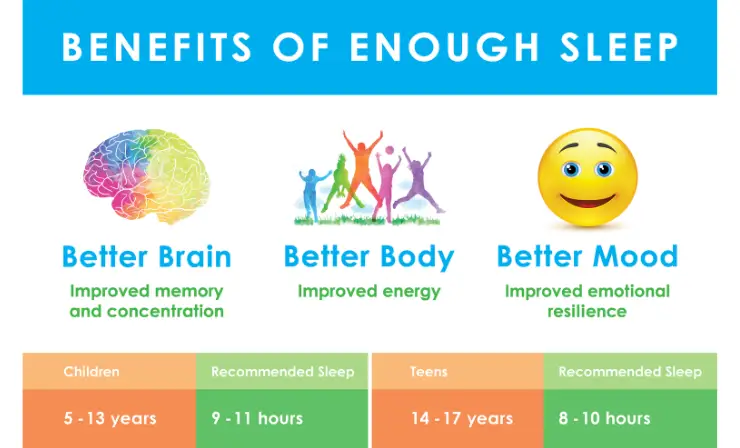
The impact of sleep on stress levels cannot be overstated. Starting school later can significantly reduce the morning rush, a source of daily stress for many students. This reduction in stress can have a domino effect on various aspects of students’ lives, including their academic performance, social interactions, and overall mental health.
By mitigating one of the many stressors in students’ lives, schools can create a more supportive and productive learning environment. The benefits of such a change extend beyond the individual, positively affecting the school culture and community at large.
- Stress stands as a formidable barrier to both learning and mental health, with its ability to impair cognitive function and negatively affect academic performance. The rush and pressure of early mornings contribute significantly to students’ stress levels.
- Adopting a later start to the school day offers students a schedule that is more in sync with their natural sleep patterns, effectively reducing morning stress and allowing for a calmer, more focused start to their academic activities.
- This reduction in stress is beneficial not only for students’ academic performance but also for their mental and physical health, contributing to a more positive, supportive, and productive educational environment.
Discover why starting school later could help teens get the more sleep they need and improve their lives in various ways in this video, addressing common concerns about sleep needs for younger people.
Discover “ 7 Research-Based Reasons Why Students Should Not Have Homework: Academic Insights, Opposing Perspectives & Alternatives ” for a comprehensive analysis of the homework debate, presenting alternative strategies to improve student learning.
The Potential Drawbacks of Starting School Later
1. scheduling sports and extracurriculars becomes more difficult.
The integration of later school start times presents a unique set of challenges for the scheduling of sports and extracurricular activities, which are vital components of a student’s holistic development. The shift could potentially disrupt the delicate balance between academic commitments and extracurricular engagement, affecting students’ ability to participate in these valuable experiences.
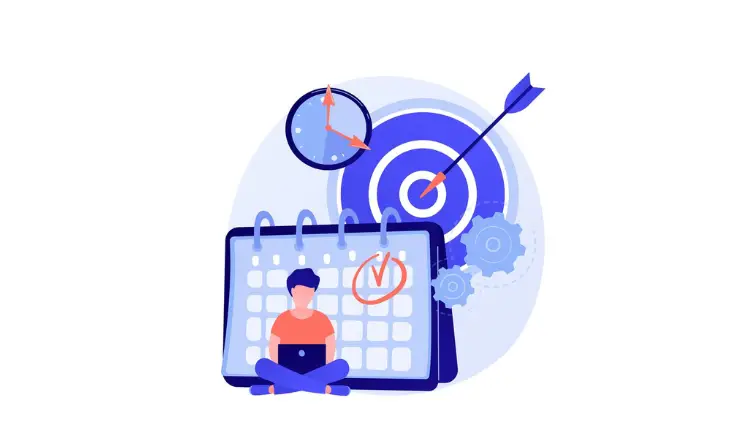
One potential drawback of starting school later is the complication it introduces to scheduling sports and extracurricular activities. Many students are actively involved in after-school programs, including sports teams, clubs, and other organizations that play a significant role in their development. This presents a clear argument for why school should not start later, as it could lead to conflicts with extracurricular activities that depend on fixed schedules. This can result in logistical challenges for both students and program coordinators, potentially causing students to miss out on opportunities that contribute to their growth beyond academics.
In response to this challenge, schools and communities can adapt by rethinking and possibly reinventing the scheduling and structure of extracurricular activities. Flexibility in planning, such as holding some activities in the morning or making more efficient use of weekends, can ensure students continue to benefit from these programs. Moreover, a later start time might actually enhance student participation and performance in extracurriculars, as students would be better rested and more focused, potentially leading to a richer extracurricular experience.
2. Increases Childcare Costs and Logistical Challenges for Working Parents
Transitioning to later school start times poses significant logistical and financial challenges for working parents, necessitating adjustments in childcare arrangements and potentially disrupting daily routines. This change can introduce added stress and financial burden on families, complicating the work-life balance that is crucial for the well-being of both parents and students.

The shift to later school start times can increase childcare costs and create logistical challenges for working parents. Parents may find themselves needing to arrange for additional morning care or adjust their work schedules to accommodate the change. This can add financial strain and complicate the balance between work and family life, creating stress and potentially impacting the overall well-being of families.
However, the community and employers can play a crucial role in easing this transition. Workplaces could offer more flexible working hours or remote work options to accommodate the needs of parents. Additionally, schools and community organizations might develop affordable before-school programs to support families. This approach not only addresses the logistical and financial concerns but also fosters a community-centric solution that benefits both students and their families.
3. May Make After-School Jobs and Activities More Difficult
Adjusting school hours to start later in the day could inadvertently impact students’ ability to engage in after-school jobs and activities, critical for their personal development and financial support. This shift may limit the time available for such commitments, posing challenges for students who depend on the afternoon and early evening hours for work and extracurricular participation.

For students who rely on after-school jobs for income or participate in non-school activities, a later dismissal time can significantly reduce the available hours for work and other commitments. This could affect their ability to support themselves or their families financially and limit their engagement in valuable community or personal development activities.
On the flip side, a later start time can lead to more alert and productive students, potentially making them more efficient in balancing work, activities, and school responsibilities. Schools and local businesses could collaborate to offer flexible working arrangements for students, recognizing the mutual benefits of supporting adolescent development while maintaining their contribution to the workforce and community engagement.
4. Reduces Time for Homework and Family Activities
A later dismissal time from school may compress the window available for homework, relaxation, and family time, essential components of a student’s well-being and academic success. This reduction in available time during the evening can increase stress and limit opportunities for meaningful family interaction and adequate academic preparation.

With a later end to the school day, students might find themselves with less time for homework, relaxation, and family activities in the evening. This compression of non-school hours could lead to increased stress, less downtime, and diminished family interaction, which are all important for a student’s well-being and academic success. Uncover persuasive reasons against adopting year-round schooling in “ Comprehensive Analysis: 8 Strong Reasons Why School Should Not Be Year-Round ” highlighting its possible effects on both students and educators.
This challenge necessitates a more efficient approach to homework and after-school time management, potentially encouraging schools to reassess the volume and nature of homework assigned. With strategic planning and support, students can learn to manage their time effectively, ensuring they have sufficient opportunities for both academic responsibilities and family engagement. Additionally, the quality of family time can improve when students are less stressed and more rested, making the time spent together more meaningful.
The Impact of Delayed School Start Times in Seattle School District
In the 2016-2017 academic year, the Seattle School District embarked on a pioneering initiative to address the chronic sleep deprivation affecting its secondary school students. Recognizing the mounting evidence on the importance of adequate sleep for adolescents’ physical, and mental health, and academic performance, the district made a decisive move to delay the start times of its secondary schools from 7:50 am to 8:45 am. This change was aimed at aligning school schedules more closely with students’ biological sleep needs, thereby enhancing their overall well-being and academic outcomes.

Researchers from the University of Washington seized this opportunity to conduct a comprehensive study, both before and after the implementation of the new start times. Their research included students from two public high schools in Seattle, providing a valuable case study on the impacts of such policy changes.
The findings, published in Science Advances, revealed significant benefits stemming from the later start times. On average, students gained an additional 34 minutes of sleep per night, increasing their total nightly sleep from six hours and 50 minutes to seven hours and 24 minutes. This increase brought students closer to achieving the recommended sleep amount and marked a reversal in the century-long trend of gradual sleep loss among adolescents.
The benefits of this policy change extended beyond just improved sleep duration:
- Improved Sleep Duration: The policy change led to longer sleep times for students.
- Enhanced Academic Performance: Observations showed a significant increase in students’ academic achievements.
- Increased Punctuality and Attendance: Notably higher rates of on-time arrivals and attendance, especially in economically disadvantaged schools.
- Narrowing Socioeconomic Learning Gap: The change suggests the potential to reduce disparities in educational outcomes between low and high socioeconomic groups.
- Reduced Daytime Sleepiness: Students experienced less sleepiness during the day, indicating better sleep quality and its positive effect on daily engagement and functioning.
Dr. Tara Narula reports on a Seattle school district that transitioned to a later start time, showcasing the positive outcomes of the study, making it a highly recommended video to watch for insights on the impact of such changes.
Despite the success observed in Seattle, such shifts in school start times remain relatively rare across the United States, where the typical start time still hovers around 8 a.m. However, the Seattle School District’s experience stands as a compelling testament to the benefits of later start times, supported by the American Academy of Pediatrics’ advocacy for this change as an effective countermeasure to the widespread issue of sleep deprivation among teenagers.
The Seattle School District’s initiative demonstrates a proactive approach to student health and education, providing valuable insights and evidence for other districts contemplating similar adjustments. By prioritizing the sleep needs of students, the district not only improved their academic and health outcomes but also set a precedent for the importance of aligning educational policies with scientific research on adolescent well-being.
Useful Resources
- Time Management Activities For High School Students
- Daily Routine For Students: Recommendations And Techniques
- How to Reduce Student Stress and Excel in School
Final Thoughts
The conversation surrounding delayed school start times is complex, yet the evidence, especially from the Seattle School District, provides clear reasons why school should start later, highlighting the potential for significant positive changes in student well-being and academic success. As education stakeholders consider the future of school schedules, balancing the advantages with logistical concerns will be crucial. Ultimately, the goal is to create educational environments that best support the development and achievement of every student.
- How Would Later School Start Times Affect Sleep?
- Sleep is key to help teens recharge for success this school year
- 4 Benefits of Later School Start Times
- Teenagers and sleep
- Drowsy Driving: Asleep at the Wheel
- School Start Times for Adolescents
- Later School Start Times More Popular, But What Are the Drawbacks?
- Students can benefit from starting school later – study
- Recent Posts

Simona Johnes is the visionary being the creation of our project. Johnes spent much of her career in the classroom working with students. And, after many years in the classroom, Johnes became a principal.
- Exploring the Evidence: 7 Comprehensive Reasons Why School Should Start Later for Enhanced Student Well-being and Academic Success - February 15, 2024
- Why Students Should Learn a Second Language for Future Success: Exploring the 7 Benefits - February 12, 2024
- 9 Reasons Why Teachers Should Accept Late Work: Balancing Discipline and Flexibility in Education - January 31, 2024
Leave a Comment Cancel reply
Save my name, email, and website in this browser for the next time I comment.
What new research tells us about elementary and middle school start times
Subscribe to the brown center on education policy newsletter, kevin c. bastian and kevin c. bastian research associate professor - unc chapel hill, director - epic @kevin_c_bastian sarah crittenden fuller sarah crittenden fuller research associate professor - unc-chapel hill and epic @sarahcfuller1.
March 23, 2023
Every morning, K-12 students across the country wake up and prepare for another day of school. While students’ morning routines may look similar everywhere—eating breakfast, getting dressed, scrambling to finish homework assignments—the time school starts varies considerably across schools. This seemingly simple start time decision can have meaningful effects on students’ sleep, health, engagement with school, and learning .
Over the last two decades, sleep research has convincingly shown that around the onset of puberty many adolescents experience biological changes that impact the timing of their sleep. Adolescents still need approximately nine hours of sleep each night, but it becomes difficult for them to fall asleep before 11:00pm and wake before 8:00am. Early school start times make it challenging for adolescents to get the sleep they need, and fatigued students may be less engaged with and successful in school.
In response to this evidence, many school districts across the country have delayed start times for their high schools. This decision is supported by sleep research and multiple studies showing that later high school start times are associated with improved attendance , course grades , behavior , and achievement .
While later start times benefit high school students, we also need to consider the indirect effects on younger students. Districts often stagger start times for elementary, middle, and high schools to allow for multiple busing runs, lessen traffic congestion, and allow caregivers to drop off children at different schools. If high schools are starting later, it likely means that elementary and/or middle schools must start earlier.
Is this a good tradeoff? Do these earlier elementary and middle school start times come at a cost to the sleep and academic outcomes of younger students? And are there better and worse ways to organize school schedules? Over the last five years, we have sought to answer these questions through a series of studies on school start times in North Carolina.
Why Do School Start Times Matter for Student Academic Outcomes?
In prior work , we put forth a theoretical model for how start times influence academic outcomes. Later school start times allow for additional sleep , which should benefit students’ alertness , attention, and memory . An increase in sleep and cognitive functioning should improve more proximate academic outcomes such as attendance, behavior, and course grades. More distally, we would expect benefits for student achievement.
Yet, studying the effects of varying school start times can be challenging. Comparing academic outcomes across schools with different start times may conflate start time effects with other characteristics of schools and districts. A more rigorous approach is to assess how changes in school start times predict changes in academic outcomes. However, schools rarely change start times, and even when schools do change start times, there are questions regarding the generalizability of those effects to other schools.
To date, there have been only a few studies on start times and academic outcomes for elementary and middle school students. At the elementary school level, prior studies do not convincingly isolate start time effects or analyze actual changes in start times. At the middle school level, a study from one district shows that shifts to later start times predict higher test scores, especially for low-performing students.
New research from North Carolina
We add to this existing research with a series of start time studies in North Carolina. This includes analyses of an urban district that shifted many elementary school start times from 9:00am to 7:45am or 8:30am, as well as statewide analyses of start times in elementary and middle schools . Our work uses eight years of administrative data and considers a broad set of outcomes—sleep, attendance, suspensions, course grades, and test scores—for all students and certain subgroups. Notably, we focus on schools that make changes to their start times rather than relying on variation in start times between schools. In combination, our studies provide the richest evidence yet regarding the connections between start times and academic outcomes for younger students.
Finding 1: Earlier start times have small, mixed effects on elementary school students
In partnership with an urban district in North Carolina, we surveyed 5th graders, districtwide, about their sleep and perceptions of their start time. Compared to peers attending elementary schools starting at 9:00am, those attending elementary schools starting at 7:45am reported getting 45 minutes less sleep per night. In addition, those starting at 7:45am were approximately half as likely—40% to 74%—to agree that their school started at the right time. These findings are consistent with prior work showing a strong relationship between school start times and sleep.
While later start times predict more sleep for elementary school students, results for academic outcomes are modest and mixed. We find that student absences increased slightly after elementary schools switched to an earlier start time (with some evidence of larger increases for white students and those living in rural areas). Conversely, we find that earlier elementary school start times predict modestly higher math scores, especially for economically disadvantaged students and students of color. In our analysis, start times do not appear to affect elementary school reading scores or suspension rates.
Finding 2: Earlier start times negatively affect middle school students
Earlier start times have more consistent and substantially negative effects for middle schoolers. We find that student absences increase after middle schools switch to an earlier start time. These results are particularly large for economically disadvantaged students and suggest that it may be difficult for some students and families to adjust to an earlier commute. Middle school students—especially middle school boys—are also less likely to be suspended after their school switches to a later start time. For instance, after a one-hour delay in start time, middle school boys are 2.5 percentage points less likely to ever be suspended during the year. Start times do not predict course grades for middle school students.
We find robust evidence linking later start times to increased test scores for middle school students. A one-hour delay in middle school start times predicts math scores 8% of a standard deviation higher and reading scores 4% of a standard deviation higher. To put these results into perspective, these estimates are larger in magnitude than the average effectiveness differences between first- and second-year teachers.
Implications for Start Time Decisions
Our findings highlight several important takeaways for state and local education officials. Like prior work in high school , our findings show that later start times benefit the academic outcomes of middle school students. Meanwhile, we find that earlier start times for elementary school students have modest and mixed effects—i.e. a small increase in absences but also a small increase in math test scores. These findings are consistent with the biology behind adolescent sleep. That is, changes in sleep patterns occur around the onset of puberty, which is generally when adolescents are in middle school or near the end of elementary school.
Taken together, our results indicate that districts should prioritize later start times for high schools and middle schools. Evidence indicates that elementary schools can start earlier to accommodate these shifts without negatively affecting student outcomes.
More broadly, we believe our results emphasize the connections between adolescent health and educational outcomes. Initiatives to improve student health—e.g., later start times, free school meals , and school-based health clinics —can be effective approaches to improve student engagement and achievement. This is particularly important in the aftermath of the COVID-19 pandemic as districts and schools work to promote student social-emotional and learning recovery.
Related Content
Sarah Novicoff, Matthew A. Kraft
November 15, 2022
Sarah A. Cordes, Christopher Rick, Amy Ellen Schwartz
June 22, 2022
Nicolas Zerbino, Marguerite Franco
June 23, 2022
K-12 Education
Governance Studies
Brown Center on Education Policy
Brad Olsen, John McIntosh
April 3, 2024
Darcy Hutchins, Emily Markovich Morris, Laura Nora, Carolina Campos, Adelaida Gómez Vergara, Nancy G. Gordon, Esmeralda Macana, Karen Robertson
March 28, 2024
Jennifer B. Ayscue, Kfir Mordechay, David Mickey-Pabello
March 26, 2024
- Share full article
Advertisement
Supported by
student opinion
Should Your School Day Start Later?
If it did, would students get more sleep? Or would they just stay up later?

By Shannon Doyne
Find all our Student Opinion questions here.
Do you get enough sleep during the school year? If not, what keeps you from being well rested?
Do you wish your school day started later? In your opinion, what would be the advantages and drawbacks of a later start time?
In “ California Tells Schools to Start Later, Giving Teenagers More Sleep, ” Christine Hauser and Isabella Kwai write about a new California law that pushes back start times at most public middle and high schools. The law cites research that says attendance and performance will improve if teenagers get more sleep. The article states:
The passage of the law followed years of mounting calls for later school start times from sleep experts who said such a move would optimize learning, reduce tardiness and contribute to overall well-being. The law encourages districts to publish research on their websites about the impact of sleep deprivation on adolescents. A frequently cited policy statement from the American Academy of Pediatrics, made in 2014, called insufficient sleep for adolescents a “public health issue” and recommended that most schools start no earlier than 8:30 a.m. The American Academy of Sleep Medicine agreed. In one 2006 poll from the National Sleep Foundation, 45 percent of adolescents in the United States said they slept for an insufficient length of time on school nights, and 19 percent of students said they fell asleep in school at least once a week. Another study, published in 2017 by the University of Minnesota, which surveyed 9,000 students across five school districts with varying start times, found that those who started school later slept more. Students who had more sleep reported better mental health outcomes and less use of substances like alcohol and cigarettes. Students who slept more also had improved attendance and enrollment rates, and they were less likely to drive while drowsy. About 90 percent of high schools and 80 percent of middle schools in the nation start before 8:30 a.m., the Centers for Disease Control and Prevention said in 2014.
Students, read the entire article, then tell us:
Do you feel like you get enough sleep?
What would be your ideal time to start the school day? What about to end the school day? Why?
How would changing your school’s start and end times affect activities like sports, clubs and part-time jobs?
Anthony J. Portantino, a Democratic state senator who wrote the bill, calls later start times for schools a “magic bullet” when it comes to education. What are your thoughts on this? Can later start times really improve things like test scores, attendance and graduation rates? Explain.
Students 13 and older are invited to comment. All comments are moderated by the Learning Network staff, but please keep in mind that once your comment is accepted, it will be made public.

It’s a wonderful world — and universe — out there.
Come explore with us!
Science News Explores
Later school starts linked to better teen grades.
Low-income students also may find it easier to get to school, the new data show
If school starts later in the morning, teenagers are more ready to learn. In a new study, students wore wrist activity trackers that pinpointed when they fell asleep and woke up. The results confirmed the benefit of later start times.
monkeybusinessimages/iStockphoto
Share this:
- Google Classroom
By Silke Schmidt
February 5, 2019 at 6:45 am
If you think school starts too early in the day, you’re not alone. Experts have long argued for later start times in middle and high school. A new study used activity trackers worn on the wrist to see how such a delay affected kids in a real school. And it showed kids slept more, got better grades and missed fewer days of class when their school day started somewhat later.
Explainer: The teenage body clock
Adolescents are different from younger kids. Most don’t feel ready for bed until after 10:30 p.m. That’s because puberty shifts everyone’s circadian (Sur-KAY-dee-uhn) rhythms. These are the 24-hour cycles our bodies naturally follow. Among their tasks: They help regulate when we fall asleep and when we waken.
The shift in our body clocks may not be as obvious as puberty’s physical changes. But it’s just as important.
The shift is related to melatonin (Mel-uh-TONE-in), the hormone that helps us fall asleep. “When puberty begins, a teenager’s body doesn’t secrete that hormone until later in the evening,” notes Kyla Wahlstrom. She is an expert on human development and education at the University of Minnesota, in Minneapolis. She was not involved in the new study.
Explainer: What is a hormone?
Even with their shifted rhythms, teenagers still need 8 to 10 hours of sleep each night. If they fall asleep late, they’ll need more snooze time in the morning. That’s why doctors, teachers and scientists have recommended for many years that school should start later.
Some school districts have listened. For the 2016–2017 academic year, the high-school start time in Seattle, Wash., changed from 7:50 to 8:45 a.m. The new study analyzed the results of that delay.
A real-world experiment
The researchers looked at sleep patterns in high school sophomores a few months before the schedule change. Then they studied the following year’s sophomores eight months after the change. In all, about 90 students at two schools took part in the study. The teachers were the same each time. Only the students differed. This way, the researchers could compare students of the same age and grade.
Instead of just asking students how long they slept, researchers had students wear activity monitors on their wrists. Called Actiwatches, they’re similar to a Fitbit. These, however, are designed for research studies. They track movements every 15 seconds to gauge whether someone is awake or sleeping. They also record how dark or light it is.
Students wore an Actiwatch for two weeks before and after the change in the school start time. They also completed a daily sleep diary. Actiwatch data showed that the new schedule gave students 34 extra minutes of sleep on school days. That made it more similar to sleep periods on weekends, when the students didn’t have to follow a set schedule.
“In addition to getting more sleep, the students were closer to their natural sleep pattern on weekends,” says Gideon Dunster. “That was a really important finding.”
Dunster is a graduate student in biology at the University of Washington in Seattle. He and biologist Horacio de la Iglesia led the new study.
The Actiwatch light-tracking showed that students didn’t stay up later after the shift in school start times. This light analysis was a new feature of the study, notes Amy Wolfson. She is a psychologist at Loyola University Maryland, in Baltimore. She didn’t work on the Seattle study. But she notes that other studies have shown that more exposure to light at night is not healthy.
Explainer: Correlation, causation, coincidence and more
Besides getting more Zzzz’s, students who could sleep in later also got better grades. On a scale of 0 to 100, their median scores increased from 77.5 to 82.0.
The study doesn’t prove that the schedule change boosted their grades. “But many, many other studies have shown that good sleep habits help us learn,” says Dunster. “That’s why we concluded that the later start times improved academic performance.”
The Seattle team published its new findings December 12 in Science Advances .
Links between snoozing and learning
Teens who don’t sleep well may find it harder to absorb new material the next day. What’s more, people who don’t sleep well also can’t process well what they had learned the day before. “Your sleep puts everything you’ve learned into ‘file folders’ in your brain,” Wahlstrom says. That helps us forget unimportant details, but preserve important memories. Every night, a fluid also flushes out molecular wastes that can damage the brain.

And there’s another link between sleep and grades. Kids won’t learn if they don’t make it to class. That’s why teachers and principals worry about kids missing school or being tardy.
To see if later start times affected attendance, the researchers looked at the two schools separately. One had 31 percent of students from lower-income families. In the other school, 88 percent came from lower-income families.
In the wealthier school, there wasn’t much change in missed school hours. But at the school with more low-income kids, the new start time boosted attendance. During the academic year, the school recorded an average of 13.6 absences and 4.3 tardies for the first period. Before the schedule change, those yearly numbers were 15.5 and 6.2.
The researchers don’t know what is behind this difference. It’s possible that lower-income kids rely more on the school bus. If they sleep late and miss the bus, it may be too hard to get to school. They may not own a bike or car and their parents may already be at work.
Lower-income kids sometimes get worse grades than their wealthier peers. Wahlstrom says there are many reasons why this might happen. Anything that helps reduce this achievement gap is a good thing. That includes better class attendance.
Wolfson thinks it’s fantastic that the activity trackers confirmed what sleep researchers had known for a long time. “I hope all this will have an impact on school districts around the country,” she says. “Moving school start times to 8:30 a.m. or later is an effective way to improve health, academic success and safety for adolescents.”
More Stories from Science News Explores on Health & Medicine

U.S. lawmakers look for ways to protect kids on social media

9 things to know about lead’s health risks — and how to curb them

Community action helps people cope with Flint’s water woes

Health problems persist in Flint 10 years after water poisoning

Family, friends and community inspired these high school scientists

The teen brain is especially vulnerable to the harms of cannabis

Synthetic biology aims to tackle disease and give cells superpowers

Being a teen has always been hard; now it’s especially so
Home — Essay Samples — Education — Starting School Later — Why Should School Start Later in the Morning: Persuasive Arguments
Why Should School Start Later in The Morning: Persuasive Arguments
- Categories: Starting School Later
About this sample

Words: 455 |
Published: Feb 9, 2023
Words: 455 | Page: 1 | 3 min read

Cite this Essay
Let us write you an essay from scratch
- 450+ experts on 30 subjects ready to help
- Custom essay delivered in as few as 3 hours
Get high-quality help

Prof Ernest (PhD)
Verified writer
- Expert in: Education

+ 120 experts online
By clicking “Check Writers’ Offers”, you agree to our terms of service and privacy policy . We’ll occasionally send you promo and account related email
No need to pay just yet!
Related Essays
3 pages / 1514 words
1 pages / 362 words
1 pages / 662 words
7 pages / 3008 words
Remember! This is just a sample.
You can get your custom paper by one of our expert writers.
121 writers online
Still can’t find what you need?
Browse our vast selection of original essay samples, each expertly formatted and styled
Related Essays on Starting School Later
Everyone has always hated getting up super early to go to school. As children get older they move to different schools, from elementary to middle to high school, and the start times get earlier. In elementary school it was never [...]
The issue of school start times has been a topic of debate for many years, with arguments on both sides of the issue. While some argue that starting school later would allow students to get more sleep and perform better [...]
Should school start times be later in the day or should they be earlier? If kids don't get enough sleep can it affect kids performance in school and sports? Not getting a enough sleep is common among students and is among many [...]
In a society where more is expected from teenage students and schoolwork is harder than that from generations before, it is necessary for the school day to start and end at later times. Early start times have created negative [...]
In a very broad sense, cheating involves betraying a partner’s expectations about the type of contact the cheater has with others. When a husband or wife, boyfriend or girlfriend, violates one’s expectations about what is [...]
Do you want equality among students in your child's school? Do you want less violence within your child's school? Would you like your daughter to concentrate more on her schoolwork and less on what name brand jeans she is [...]
Related Topics
By clicking “Send”, you agree to our Terms of service and Privacy statement . We will occasionally send you account related emails.
Where do you want us to send this sample?
By clicking “Continue”, you agree to our terms of service and privacy policy.
Be careful. This essay is not unique
This essay was donated by a student and is likely to have been used and submitted before
Download this Sample
Free samples may contain mistakes and not unique parts
Sorry, we could not paraphrase this essay. Our professional writers can rewrite it and get you a unique paper.
Please check your inbox.
We can write you a custom essay that will follow your exact instructions and meet the deadlines. Let's fix your grades together!
Get Your Personalized Essay in 3 Hours or Less!
We use cookies to personalyze your web-site experience. By continuing we’ll assume you board with our cookie policy .
- Instructions Followed To The Letter
- Deadlines Met At Every Stage
- Unique And Plagiarism Free

IMAGES
COMMENTS
7. Reduced Stress. The stress induced by early mornings and lack of sleep can significantly affect students’ academic and social lives. By moving the start of the school day later, schools can alleviate a major source of daily stress, contributing to a healthier, more conducive learning environment.
Introduction. Benefits Of Starting School Later. An early school day affects the overall learning environment. When classes start later, attendance improves, and tardiness decreases. Sleep affects academic performance. Later school schedules lower the risk of health problems. Later school activities can lower the risk of vehicular accidents.
Sleep is as important as what you put into your body. K-12 schools should start later in the morning in order for students to get the required amount of sleep to be able to focus and engage in school, have a better attitude, and have better physical and mental health. Students need plenty of sleep to be able to function well in school.
This includes analyses of an urban district that shifted many elementary school start times from 9:00am to 7:45am or 8:30am, as well as statewide analyses of start times in elementary and middle ...
83% of U.S. public high schools started before 8:30 a.m. in 2020. 44.2% of surveyed parents say they like school start times the way they are, with 34.8% wanting later starts and 21% seeking earlier ones. 69.2% of parents and guardians say their school-age children were getting sufficient sleep this past school year.
Schools start so early in the morning that it is hard to focus, and students tend to miss more of their earlier classes and attend all their later classes. Schools everywhere should start later because it would benefit the students and teachers. All children need sleep and want sleep during the weekdays and that is very difficult.
The article states: The passage of the law followed years of mounting calls for later school start times from sleep experts who said such a move would optimize learning, reduce tardiness and ...
If they fall asleep late, they’ll need more snooze time in the morning. That’s why doctors, teachers and scientists have recommended for many years that school should start later. Some school districts have listened. For the 2016–2017 academic year, the high-school start time in Seattle, Wash., changed from 7:50 to 8:45 a.m.
Why Should School Start Later: Negative Effects of Early School Start Essay Everyone has always hated getting up super early to go to school. As children get older they move to different schools, from elementary to middle to high school, and the start times get earlier.
The Science of Sleep. In the U.S., the average start time for middle and high schools is a few minutes after 8 a.m. It hasn’t always been this way, though. A century ago, most schools started around 9 a.m. Then in the 1970s, districts began shifting to earlier schedules for teens, with elementary age kids starting later.